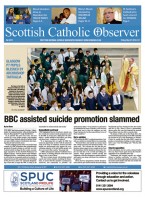BY Ian Dunn | July 12 | ![]() 0 COMMENTS
0 COMMENTS ![]() print
print

Appeals court rules diocese can be held liable for priests’ offences
Portsmouth Diocese Trustees may take case to UK Supreme Court, not dismiss the claims of abuse victims but to protect the Church
The Appeals Court of England and Wales today ruled that the Catholic Church can be held liable for the wrongdoings of its priests, but the decision was not unanimous.
Portsmouth Diocese, which had brought the appeal, said it was now considering taking the case to the UK Supreme Court.
Last year Mr Justice MacDuff decided in favour of a woman who claimed she was abused as a child by a priest of Portsmouth Diocese. The Court of Appeal has now upheld the lower court’s decision in her favour in the JGE v The Trustees of the Portsmouth Roman Catholic Diocesan Trust case.
The trustees of Portsmouth Diocese said in response to today’s judgment that they had a duty to contest the decision.
“We brought this appeal in order to achieve clarity as to the nature and extent of the bishop’s liability for the actions of diocesan priests,” their statement said. “A number of judgments in recent years have sought to extend the scope of vicarious liability, which is designed for relationships of employment, to very different relationships, including that between a bishop and his priest, who is an office holder and not an employee. We had not just the right but the duty to ask the Court of Appeal to hear the different arguments in this case, not least because of the far-reaching implications to faith and other voluntary organisations of extending vicarious liability in this way.”
The diocesan statement pointed out that the decision was not unanimous, ‘which emphasises the complexity of this area of the law.’
“The two judges who found against us acknowledged the force of our arguments and all three appeal judges commented on the difficulty of reaching a decision,” the statement said. “The judges also referred to the wide-reaching ramifications of the decision, not just for the Church but for other organisations, both charitable and commercial. Because this case raises complex questions of law of real public importance, the Trustees will now be seeking advice from leading counsel as to a potential appeal to the Supreme Court.”
The trustees also stressed that their motives in bringing the appeal was not to dismiss the claims of abuse victims but rather protect the Church.
“This case is not, and has never been, about seeking to avoid or delay the payment of compensation to victims with valid claims,” they say. “The Diocese has for years been offering support to clerical abuse victims, and the law rightly allows victims to sue for damages on grounds of negligence, or, of course, to seek redress from the actual perpetrators of the abuse. This case is about fundamental legal principles involving the very nature of civil society and religious freedom. It would be disastrous if, in seeking to provide redress for victims of harm, the law put intolerable new pressures on the voluntary sector. This judgment shows further thought and scrutiny are required before clarity in this regard can be established.”
Pic: St John’s Cathedral Portsmouth











